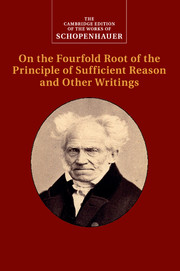Book contents
- Frontmatter
- Contents
- General Editor’s Preface
- Editorial Notes and References
- Introduction
- Notes on Text and Translation
- Chronology
- Bibliography
- Collation of the Two Editions of On the Fourfold Root
- 1 On the Fourfold Root of the Principle of Sufficient Reason
- 2 On Vision and Colours
- 3 On Will in Nature
- Glossary of Names
- Index
Introduction
Published online by Cambridge University Press: 30 June 2022
- Frontmatter
- Contents
- General Editor’s Preface
- Editorial Notes and References
- Introduction
- Notes on Text and Translation
- Chronology
- Bibliography
- Collation of the Two Editions of On the Fourfold Root
- 1 On the Fourfold Root of the Principle of Sufficient Reason
- 2 On Vision and Colours
- 3 On Will in Nature
- Glossary of Names
- Index
Summary
For the sake of the few who are ahead of their times and have paid attention to my philosophy, I am breaking a seventeen-year silence, in order to provide some of the corroboration that my philosophy has received from unbiased empiricists who were unacquainted with it, and whose method, aimed at mere knowledge from experience, allowed them to discover at its end point just what my theory has presented as the metaphysical point from which experience in general is to be explained. This situation is all the more encouraging because it distinguishes my system from all previous systems, all of which, not excepting even the most recent by Kant, still leave a wide gap between their results and experience, and are very far from reaching down immediately to experience and touching it. My metaphysics proves itself to be the only one that actually has a common point of contact with the physical sciences, a point at which they meet it by their own means, so that they actually connect and agree with it; and in fact this is not accomplished by twisting and forcing the empirical sciences to suit the metaphysics, nor by secretly abstracting metaphysics ahead of time from the empirical sciences and then, in Schelling's manner, finding a priori what it had learned a posteriori; rather, by themselves and without conspiring, both meet at the same point. Therefore, my system does not, like all previous ones, float in the air high above all reality and experience, but descends to this firm ground of actuality where the physical sciences receive the learner in turn.
The empirical corroborations fromother source to be cited here, all concern the core and principal point of my theory, its metaphysics proper; that is, they all concern that paradoxical, fundamental truth, the truth that what Kant called the thing in itself as opposed to mere appearancea (more definitely called representation by me), and considered absolutely unknowable – that this thing in itself, I say this substratum of all appearances and hence of all nature, is nothing other than that with which we are immediately acquaintedc and precisely intimate,d that which we find in our innermost selves as will;
- Type
- Chapter
- Information
- Schopenhauer: On the Fourfold Root of the Principle of Sufficient Reason and Other Writings , pp. 323 - 330Publisher: Cambridge University PressPrint publication year: 2012

